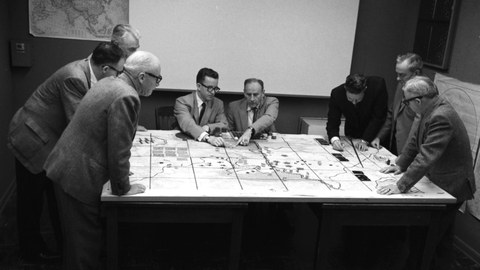Speculative History of AI

Engineering Operations game with Milton Weiner (3rd from right), Olaf Helmer (2nd from right), and others, 1966 RAND Archives https://www.rand.org/about/history.html
This project will examine a genealogy of ideas concerning decision making, technology, freedom, and evolution in post 1970’s economics, the human and life sciences, and finance.
Heuristically borrowing from the motto of the French and Haitian States, I intend to trace the reformulation of categories fundamental to liberalism and liberal economic thinking through technologies of machine learning and artificial intelligence. The central argument is that beginning in the 1970’s a combination of economic theory and financialization, shifts in models of nature, evolution, and environment, and transformations in understandings of cognition and neuro-science merged to reorganize ideas of intelligence. Intelligence began to be understood as networked, self-organizing, and dispersed into the environment. Markets (and later digital social networks) came to be understood as the only mechanisms that could coordinate decision making at scale. And finally, concepts like freedom and revolution were recast in terms of biological systems. These changes have come to shape how artificial intelligence is governed, imagined, and designed in our present. Moreover, I argue the ideology and technology of self-organization underpins contemporary machine learning technologies to the detriment of civil rights and political enfranchisement of queers, women, blacks, and many other groups and to the support of reactionary politics.
I will trace three categories. 1) Liberty: the reconceptualization of the notion of freedom in neo-liberal economic thought and in the cognitive and neuro-sciences, as related to technology and the market. 2) Equality and Determinism: The re-imagining and traffic of ideas of “equality” as understood in terms of weights and statistics and determinism in evolutionary biology and machine learning. And 3) Fraternity: how have histories of sociology, evolution, and demography, concerning difference and affiliation between human groups and more than human species shaped contemporary architectures and technologies of social networks and machine learning?
Critical to this study is expanding from research on one technology (GANS or transformer architecture for example) to more broadly asking about human decision making and its automation in the late 20th century and early 21st. Artificial Intelligence is treated not as a technology but as an epistemology—a frame shaping practice, representation, and technology. The main concern is shifting questions from whether technology will replace the human, to what forms of humans and machines are desired in the future? And by whom? And for whom?
Related Publications:
-
“The Future will not be Calculated: Neural Nets, Neo-liberalism, and Reactionary Politics”, Critical Inquiry, Volume 48, Number 2, Winter (2022): 334-359.
-
“Optimal Brain Damage: Theorizing the Nervous Present” w/ Johannes Bruder, Culture Machine, Vol. 20 September (2021).
-
“Cybernetic Rationality”, Distinktion: Journal of Social Theory, Vol. 15, No. 2, (2014): 1–16
